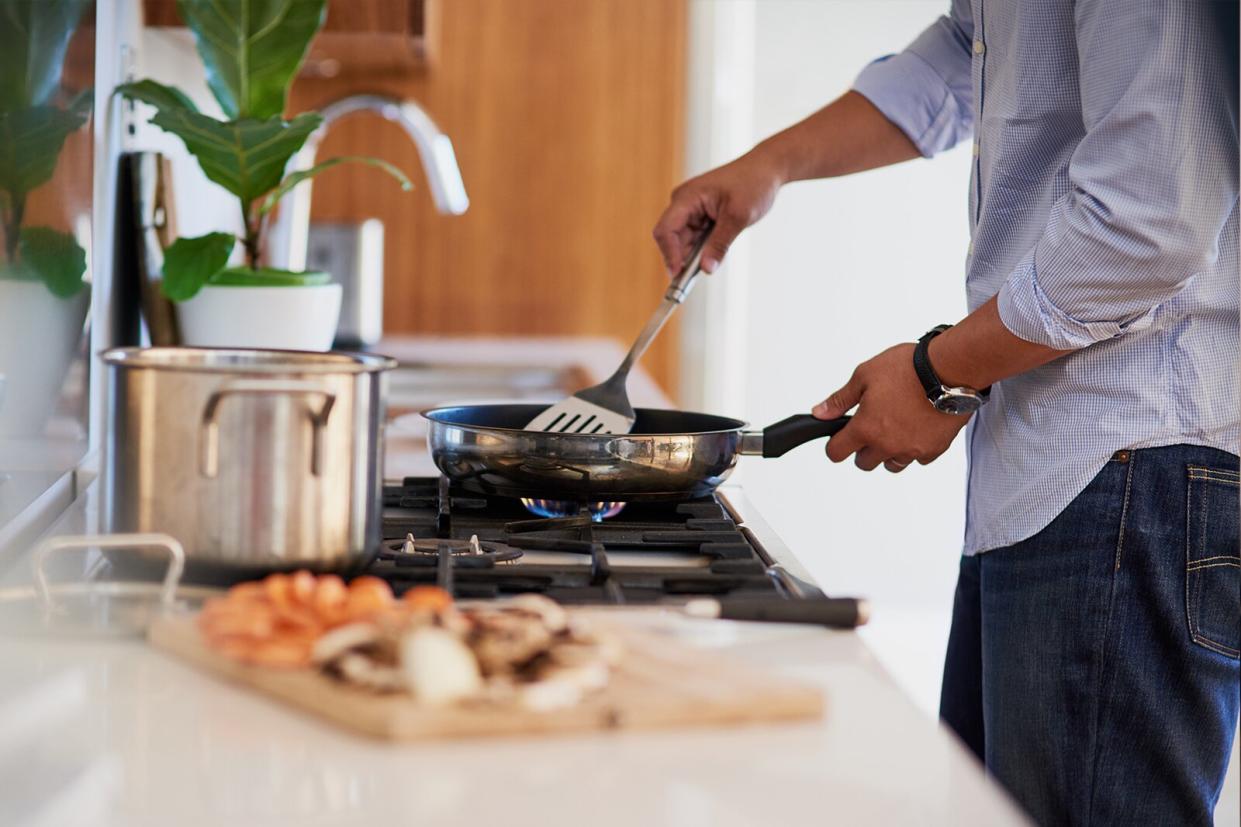5 Essential Tips to Prevent Kitchen Fires—Plus, What to Do if There's a Flare Up

PeopleImages / Getty Images
Kids popping in with questions, text messages and email alerts pinging on your cell, all the while you're pulling items from the fridge or pantry and putting things on the stovetop. Our kitchens are full of distractions, making the setting ripe for grease flare-ups and other kitchen fires.
Related: How Long Can You Safely Store Leftover For?
"When it comes to home cooking, it's so important to ensure you are doing everything you can to prevent grease fires," says James Watts, who runs the online cooking resource, Own The Grill. "Not only are they dangerous, but they are also difficult to put out. You don't want to have to be in a position where this could potentially happen as they are easily avoidable."
5 Ways to Prevent Kitchen Fires
These common sense points go a long way to helping you avoid flare ups.
Wear Appropriate Kitchen Clothing
After a long day of running around, it's easy not to think about your clothing when you start cooking dinner, but it's essential to be mindful of what you're wearing while cooking. Loose clothing can easily catch fire. Wear shorter close-fitting clothing, or make sure you've tightly rolled up your sleeves.
Know the Smoke Points of the Oils You're Cooking With
All oils, butter, fats, and greases have different smoke point temperatures. Be aware of those smoke points so you can avoid exceeding the temperature.
"The most common cause of grease fires is generally the cook's lack of knowledge about the smoke points of various cooking oils," says Jessica Randhawa, head chef and owner of the family-friendly recipe site The Forked Spoon. "When the smoke point temperature is exceeded, the oil can ignite, causing a grease fire."
Add Oil Slowly
Rather than adding oil all at once, add it slowly to discourage a flame from occurring. This will also stop any accidental oil spills.
Clean Your Stovetop Regularly
If you do accidentally spill anything, make sure that you clean it up as any leftover grease can easily catch fire. Ideally, you want to give your stovetop a thorough cleaning after each use but commit to doing it at least once a week.
Stay in the Kitchen While You're Cooking
This may sound obvious, but again those distractions—your partner is calling you from another room, the kids want you to look at something, you need to sign for a package—before you know it you've stepped away.
"A pan shouldn't be left alone, especially when cooking at such a high temperature," says Watts. "It only takes one small moment for the grease fire to begin." You want to be able to see anything that might spill or catch on fire as quickly as possible, as the faster you see a grease fire, the more time you have to put it out. If you have to leave the room, turn off the stove or cooktop.
What to Do if There's a Kitchen Fire
Accidents happen and even the most cautious among us might have a grease flare up occur. If you do, stay calm and do not put water on the flare up. Our instinct is to pour water on a fire but that won't extinguish a grease fire. In fact, it could worsen it.
If the flare up is contained to a pot or pan, use a metal lid to cover it and suffocate the flame, also don't be afraid to grab and use your fire extinguisher.
"All kitchens should have a kitchen fire extinguisher or a dry chemical fire extinguisher in the kitchen in an easily accessible place near the cooking appliances in case of a grease fire," says Randhawa. "To put out a grease fire, pull the safety tab of the fire extinguisher, point the nozzle, and spray on and around the fire until the fire is extinguished."

